- Home
- John Kendrick Bangs
Cattle-Ranch to College Page 11
Cattle-Ranch to College Read online
Page 11
CHAPTER IX.
A "BAD MAN'S" END.
"That's where Mexican Jack was killed," answered Abe, coming in thedoorway, frying pan in hand. "He was shot just where you sit. I'll tellyou about it after supper."
John moved away from the spot.
Before long the ranchman called them in, and they enjoyed a supper thelike of which had not fallen to their lot since they left the mine. Thecompliment the boys paid Abe's cooking did much to win his heart. Thoughthey were anxiously waiting to hear the story of the bullet holes andthe spot of blood, Abe continued to talk about gravies, the advantagesof a very hot pan in cooking, and other culinary topics that would haveinterested John at another time, for he rather prided himself on hisability as cook, but which now seemed more than trivial.
The boys lent a hand, and soon the tins were washed and the heavy dealtable cleared. The fire replenished, and Abe's pipe fairly started, allthree drew their stools up to the blaze.
"Well, how about Mexican Jack?" ventured Ben at last, unable to restrainhis curiosity longer.
"Oh, yes, I was going to tell you about that, wasn't I? Well, he was ahard case," continued the speaker. "Half Mexican, half white man--andall bad, he was. I made his acquaintance about ten years ago at BoiseCity, and the first thing I heard of him was that he'd just killed agambler--gambler was a hard case, so nobody cared much--and Jackskipped. Shortly after that he went to Denver and bullied the town. Oh,he was a regular 'bad man.' You know what a 'bad man' is, don't you?"
"Sure," said John. "Tough customer who knows he's tough and takes pridein it. They're always mighty quick with their guns, and dead shots. Oneof 'em shot a man in the arm, near our shack back in Bismarck, andmother tied it up. It was queer; the bullet went right through and itlooked like a rose where it came out."
"Well," continued Abe, "Jack was a 'bad man,' and he didn't care whoknew it. He had a shooting scrape in Denver and had to jump the town inpretty lively style. The sheriff's posse got after him, but he killedtwo of 'em and got off. After that every sheriff in the country waslooking for him, so he turned outlaw and road agent near Virginia City,and held up Ben Halliday's stages till the vigilance committee hung someof his partners and got too hot on his trail. Not a thing more did Ihear of him till he turned up about two years ago with this bunch ofsheep of your father's. He had turned herder and driven 'em all the wayin from Utah." Miller stopped to relight his pipe, for he had forgottento keep it going in the interest of his tale. The boys were impatient atthe least delay; the ruddy firelight lit up their faces and showed theireager interest.
"Your father had bought this ranch and put me in charge just a littlewhile before Mexican Jack came along; I spotted him at once and hespotted me, but I didn't let on, for I knew he was all-fired quick withhis gun and I wasn't looking for trouble. Of course he never went totown: it wasn't healthy for him there; and if he wanted anything he hadto wait till somebody who was going in would get it for him. Even withsuch care, though, he knew it wasn't safe for him to stay in one placevery long, so one day in spring he told me he was going to quit and moveon. Don't you boys ever turn 'bad men,'" said Abe, with a laugh; "itdon't pay. Brave as that poor chap was, he was fairly afraid of hisshadow when he got to thinking of sheriffs' posses. One man isn't muchgood against the law, even out here. Well," he went on, "I went to townto get another man--it's thirty miles, so I stayed over night. CharleyBoyd, who runs a liquor joint there, told me a young feller, anEnglishman, he thought, had been in there several times asking aboutsheep. Charley said there might be some business in it, so I dropped inlater.
"Boyd went up to a young chap who was sitting watching a faro game.'Here's your man, Mr. Simmons,' said he. The stranger wanted to know allabout the different bunches of sheep near there, so I told him andtalked a good deal about one thing or another having to do with them. Iremember I told him I was looking for a herder to take the place of aMexican that was going to quit. Soon after that he left. I could notquite make him out, but it was plain enough he wasn't buying."
"What's all this got to do with Mexican Jack?" inquired Ben, who didn'tsee the drift of the narrative.
"If you wait a minute, I'll tell you." Abe was vexed at the thoughtlessinterruption, and Ben subsided, realizing that he had been ratherfoolish. "In the morning I packed my stuff on the led horse, mounted myown cayuse, and started out. I had just topped the rise near the shackwhen a bullet went by with a hum, and then another and another, so Ichased back for cover to the other side. I dismounted, crawled up to thetop, and looked over. There at the door sat Mexican Jack, six-shooter inhand. I couldn't understand why in the world he should shoot at me, so Irode over to look up Billy, the other herder, and find out what was up.He hadn't been to the shack since morning and knew nothing about it, sohe left the sheep and we went down the coulie, which runs just belowhere, you know, till we got behind that clump of brush--perhaps you sawit. We peeked through pretty cautious, I can tell you. The Mexican wasstill there, but his body was all hunched up; he seemed drunk or asleep,for his six-shooter lay on the ground by his side.
"We covered him with our guns, for he was chained lightning with hisshooting irons, and then yelled at him. He didn't answer or move aninch. We jumped out then, still keeping him covered, and walked slowlyup, ready to riddle him if he should make a move with that deadly pistolhand of his. Once he quivered a bit and his right hand stirred towardhis gun. I almost plunked him then, I was so nervous, but there was noother sign of wakefulness or life. We decided he must have gotten holdof some liquor somewhere, but when we got within about fifty feet of himBilly noticed a pool of blood at his side. Then we rushed forward--gunsstill ready, however--and just as we reached the steps he lurchedforward and fell full on his face--dead!
"A couple of bullets had gone clean through him. We found out when weturned his body over to the authorities in town that Simmons, the youngEnglishman I had met, had come over to America a year before expresslyto kill Mexican Jack, who had shot his brother in some quarrel. I hadsupplied the missing link of information, and he had gone early in themorning to our shack, where he had shot the Mexican twice. Jackevidently thought I had given him away purposely and tried to settleme."
"My! what a fiend," said John. "But what became of Simmons?"
"Oh, he went back to town and gave himself up, was tried, and acquitted;for no jury out here would convict such a man for shooting a bad lotlike Mexican Jack."
"I should think you'd be glad to get rid of him," exclaimed both boysin chorus. "Weren't you afraid to have him round so long?"
"Oh, no; he wouldn't trouble me, I guess, as long as I let him alone; hewas a blamed good herder, and it was worth while to keep on the rightside of him. Now, you boys want to tumble in, for we'll be going outright early in the morning to the range."
The twenty-five-mile trip next day to the range where the sheep weregrazing was made without incident, but the country was all new to theboys and they plied their guide with questions. They learned that AbeMiller was to stay with them on the range and teach them their duties,another man taking charge at the ranch house during his absence.
It was expected that Mr. and Mrs. Worth would move to the new mine(about fifteen miles from the ranch house) in a couple of months.
Their education as herders completed, the boys would be given solecharge of a large bunch of several thousand sheep. A kind of shed, openin front and built of round, chinked logs, entirely lacking in comfortsof every kind, was to be their home. Polly, Dick, and Pete, the threesheep dogs, and the great flock of woolly animals would then be theironly companions.
Abe initiated them at once into the routine of their new occupation andintroduced them to "Polly" and her two sons, Dick and Pete, theever-vigilant, intelligent dogs who were to be their capableassistants.
MANY LAMBS IN THE FLOCK. (_Page 149._)]
It was hardly the work that an enterprising, wide-awake, active person,young or old, would choose. Untiring vigilance was the one thingnecessary. Watchfulness never ceasin
g, day and night, rain and shine,was the chief occupation of the sheep herder. Polly, the dog, was a muchbetter herder than her young masters at first, and Dick and Pete werenot far behind. They moved the "bunch" to fresh feeding grounds at thecommand, and fully understood the wig-wag code of the plains. Whendriving at a distance from camp Polly would trot to a hill top and watchfor the boys' signal: if John waved horizontally she would drive themfarther, Dick and Pete assisting; when the bunch had been driven farenough John's hat would be flapped up and down, and the dogs, withalmost human intelligence, would at once stop their charges.
The attacks of coyotes, wolves, and, more rarely, mountain lions werethe greatest danger to the sheep that the young shepherds had to guardagainst. Some of these four-footed enemies were almost always prowlingabout, looking hungrily for a chance at a stray sheep or lamb. A coyoteor wolf among an unprotected flock will destroy a surprising number ofsheep in a few minutes, seemingly for the pure love of killing, so therewas good reason for the sharpest kind of lookout.
After the novelty of the life wore off, the boys began to wishthemselves back at the mine. For weeks at a time they did not seeanother human being. Each day was like every other day; in the morningthe rope corral enclosing the flock was let down, and the sheep weredriven by the dogs to a place where the feed was good; then the boysmounted their horses and followed to the grazing ground. During the twomid hours of the day the animals rested, lying down quietly, and thebrothers would take advantage of this time to get in as much sport asthe spot afforded. Rifles were always slung on the saddle, and theslinking coyotes gave plenty of opportunity to show good marksmanship.Occasionally the curiously marked antelope appeared, looking, as CharleyGreen once said, "as if some one had started to paint the whole lot tanbut had got tired of the job and left patches of white at odd places";then the young hunters would set out, and in the excitement of a huntforget for a time the monotony of the life. Seldom was it safe for bothto go at once; only at noon, when the sheep were lying down in open,level country, could the dogs be left wholly in charge.
Towards evening the bunch must be corraled for the night--a difficulttask if there are many lambs in the flock. The boys found, often totheir disgust, that a lamb can run like a deer when it gets thoroughlyfrightened. It was shortly after Abe had left them that, in accordancewith his teaching, they began to "round up" the flock preparatory tostretching the rope corral. Ben was on one side with Polly and Dick,John on the other with Pete; all was going well, and John and Pete,neither very experienced in the business in hand, began to feel thepride that goeth before a fall. Suddenly the sheep fifty yards fromwhere John stood began to scatter. Pete was sent forthwith to force themback, and while he was busy there a lamb, long and clumsy of leg,apparently not strong enough to stand alone, started out on a voyage ofdiscovery not ten yards from the boy. It would not do to let it strayfar, for a coyote would make short work of it, so John sped off inpursuit.
As he drew near the little woolly thing it increased its speed, runningas you would imagine a rickety table would run, but it kept going fasterand faster. John, who unfortunately was on foot, found to hismortification that he could not overtake it. It looked as if he wouldhave to give up the chase. At last, however, he tried gradually turningto one side and heading it back to the bunch; even then it might havegot away if Polly, taking in the situation, had not flown to the rescue.John came back panting, hot, and tired, only to find Ben sitting calmlyin his saddle with a broad grin on his countenance. Even the dogs seemedto be laughing, their open mouths and lolling tongues giving their facesa look of keen enjoyment over his discomfiture.
Even after the flock was safely corralled it required almost as muchwatching as if in the open. The boys usually took turns, each watchinghalf the night. A fire was built on one side of the enclosure, and thewatcher lay on the other. The sheep, probably the most helpless animalsone could find, lay right up against each other, their closely packedbodies looking at night like a patch of snow.
As the young herder fought with himself to keep awake, the howl of acoyote often broke the stillness; then he must start up, gun in hand,and make a round of the flock. From time to time he replenished the fireand made a careful scrutiny of the country round in search of thelurking enemies of his charges. Till he woke his brother about midnightthere was hardly a minute's rest. Then Ben took up the vigil, whileJohn slept till daylight; and so began another weary day exactly likethe preceding one.
While in summer sheep are docile and amiable, though never sointeresting as are cattle, horses, or mules, in winter they becomestupid, intractable, and aggravating to the herder. It was in the winterthat the boys' greatest hardships were encountered, for they found itnecessary more than once literally to carry some of the flock throughsnow drifts to the ranch. They would not be driven or led, but when atrail had been made, and a number carried and forced along it, theremainder would pluck up courage to follow through the bank of snow.
The boys spent all one summer and winter with the sheep. From time totime Mr. Worth, who had moved his entire outfit over to the new mine,came out to the range to inspect the animals; and towards the end of theyear the boys each time besought their father to let them go back withhim. For the first time they realized the meaning of an expression theyhad often heard: "as crazy as a sheep herder." The shepherd's life inthe far West is as uninteresting, ambitionless, and lonely an existenceas falls to the lot of man. For long periods of time a shepherd is soentirely alone with his flock and his dogs that the experience notinfrequently costs him his reason. It was a terribly lonely life foryoungsters such as they; though each was company for the other, theyboth longed to hear the home sounds and see the familiar faces. Mr.Worth, however, would not consent to their return till the year was up.He felt that the discipline was good for them, and besides he was neverwilling to have them let go of anything without finishing it.
The new mine was the most important and largest that had been opened. Itwas situated on the line of the railroad that had just been constructed,and was of a more permanent character than the preceding ones. Many ofthe miners brought their wives and families with them, so that theyformed quite a settlement. Occasionally the miners' sons would ride outto visit the Worth boys, who were delighted to see them, though therewas little in common between them. The miners were Easterners, as arule, and knew nothing of horsemanship, hunting, or plains-craft; butthey were boys and were gladly received as such. They regaled John andBen with accounts of the happenings at the mine, but while they listenedeagerly, this only added to their impatience to return and made themmore discontented with their present life.
When the snow began to melt and the grass to grow green again, thebrothers occupied most of their time in thinking what they would do whenthey got back to civilization, for the time of their release was drawingnear.
"I'd go crazy if I had to stay here with these woolly idiots anotheryear," said John one day.
"Yes," returned Ben, "it's about as tame as anything could be. But whatare we going to do when we get back? You can bet your bottom dollarfather won't let us sit round and enjoy the view."
"I suppose we'll have to get to work at something." John stroked Polly'shead reflectively as he spoke, and the good dog, undemonstrative always,showed her pleasure only by the slow wagging of her bushy tail.
"But what?" It was Ben who spoke. "I'll be switched if I want to go tocoal mining, and I guess you don't care about it either."
"That's right," replied John, laconically. "I've had enough of mining tolast me a lifetime." He shivered a little at the remembrance of hisexperience.
For a time both were silent; each was trying to think of something hemight turn his hand to that would suit his father and at the same timeplease himself. It was not an altogether cheerful prospect that laybefore them. They would soon change the solitude for their bustling,busy home. It was home, and that was good to think of. Yet it was a homewhere a boy's love of fun and his healthy animal spirits were notconsidered: his capacity for work wa
s what counted. A home whereuncongenial, hard labor awaited them unless they could think of someother occupation that would satisfy their stern, just, absolutely honestbut unyielding father.
"Well?" said Ben at last.
"Well!" returned John in much the same tone, "there is one thing wemight do--perhaps."
"Well?" said Ben again, eagerly.
"You remember when young Watson was over here the other night," Johnbegan. "He said that a mail route was to be run from Ragged Edge Camp tothe railroad, through the pass in the mountain----"
"Yes, and he had the job. That shuts us out, doesn't it?"
"Wait a minute!" exclaimed John, impatiently. "He's a tenderfoot, andhe'll never in the world be able to make that trip on time, inwinter--he'll never be able to make it at all. You'll see that after hehas been late a few times we'll have a chance. Then I intend to applyfor the job. See?"
John was the more aggressive, the stronger of the two, both in mind andbody. The younger brother had learned to lean on his more independentspirit, so it was John who always had the deciding voice when there wasa doubtful plan. Ben's yielding disposition enabled him to get alongmore comfortably with every one, and especially with the supremeauthority in the household.
The Worth boys soon learned from their occasional visitors that theywould be expected to show their prowess as boxers and wrestlers on theirarrival in camp, so they determined to practise up. Every day at noon,when the sheep lay down, the two went at each other, good humoredly butwith seriousness, advising one another when a mistake was made. Everyblow, every trick, that Tom Malloy had taught John they tried till theyknew it perfectly. Every feint, every fall, that the Indians practisedthey perfected, till by the time their term with the sheep was up theirbodies were as supple and their muscles as strong as constant exerciseand clean, healthy living in the open air could make them.
At last the new men arrived, the boys turned over the sheep to them, andpromptly saddled up for their ride across the mountains. They were gladto get away from the ranch, but when they reviewed the passed longmonths and realized that they had not flinched, they experienced thatpeculiar pleasure that comes from carrying through a hard job.

 The Genial Idiot: His Views and Reviews
The Genial Idiot: His Views and Reviews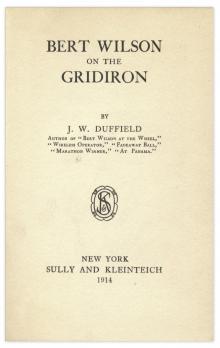 Bert Wilson, Marathon Winner
Bert Wilson, Marathon Winner The Enchanted Typewriter
The Enchanted Typewriter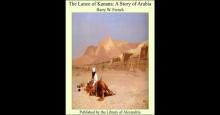 The Lance of Kanana: A Story of Arabia
The Lance of Kanana: A Story of Arabia Coffee and Repartee
Coffee and Repartee The Idiot at Home
The Idiot at Home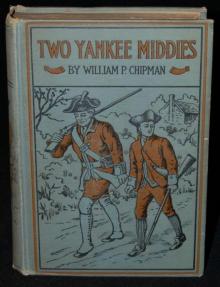 Budd Boyd's Triumph; or, The Boy-Firm of Fox Island
Budd Boyd's Triumph; or, The Boy-Firm of Fox Island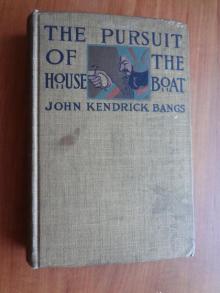 The Pursuit of the House-Boat
The Pursuit of the House-Boat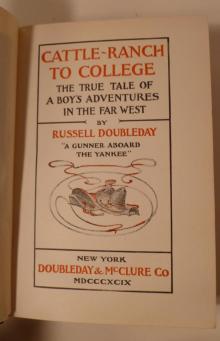 Cattle-Ranch to College
Cattle-Ranch to College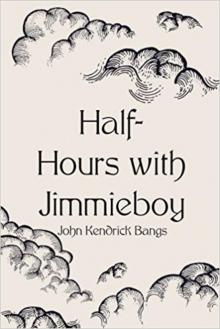 Half-Hours with Jimmieboy
Half-Hours with Jimmieboy Bikey the Skicycle and Other Tales of Jimmieboy
Bikey the Skicycle and Other Tales of Jimmieboy Toppleton's Client; Or, A Spirit in Exile
Toppleton's Client; Or, A Spirit in Exile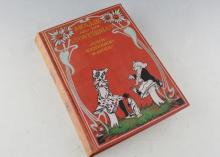 Mollie and the Unwiseman
Mollie and the Unwiseman The Inventions of the Idiot
The Inventions of the Idiot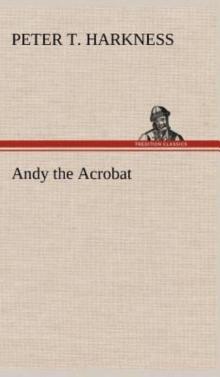 Andy the Acrobat
Andy the Acrobat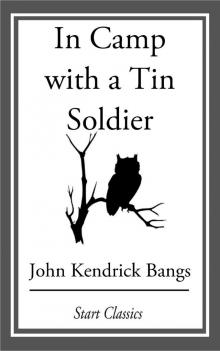 In Camp With A Tin Soldier
In Camp With A Tin Soldier Angel over the Right Shoulder
Angel over the Right Shoulder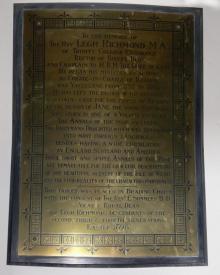 Annals of the Poor
Annals of the Poor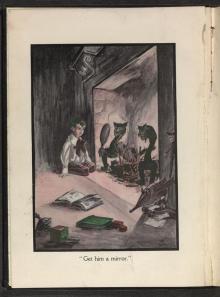 Andiron Tales
Andiron Tales Andy at Yale
Andy at Yale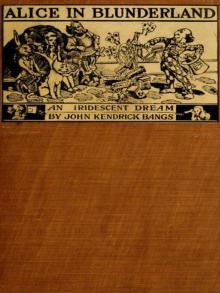 Alice In Blunderland
Alice In Blunderland